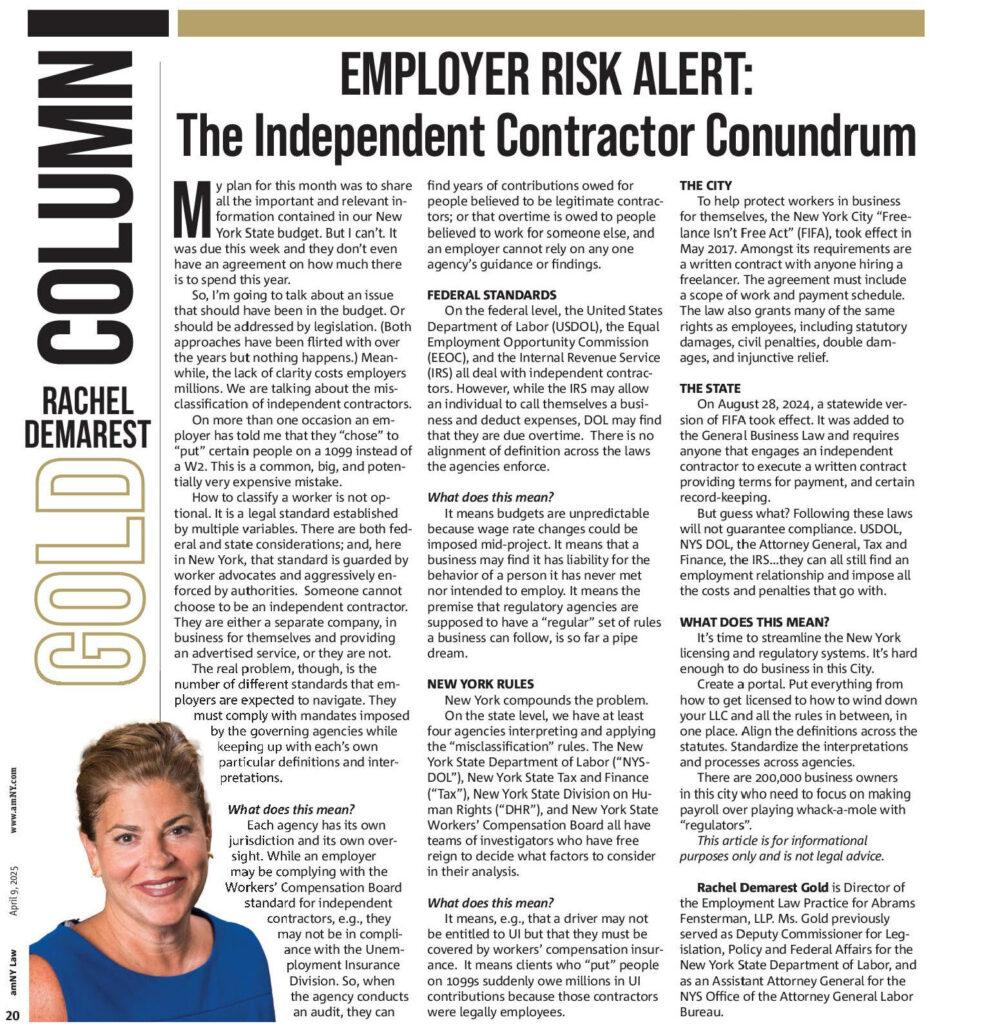Governor Signs Legislation to Protect Domestic Workers
On July 1, 2010, both houses of the State Legislature passed legislation (A1470-B/S2311-E) designed to protect domestic workers from unfair labor practices. In a bill signing ceremony this morning, Governor David Patterson signed the bill into law. The new law is effective November 29, 2010 (90 days from its date of signing).
Background
Many federal and State labor and employment laws apply to employers based on the number of individuals they employ or the annual dollar amounts generated by the employer. For example, the State Human Rights Law, which prohibits employment discrimination based on a number of factors (e.g., age, race, creed, color, national origin, gender, disability, marital status, sexual orientation, partnership status, alienage or citizenship), applies only to employers with four or more employees. Many employers of domestic workers do not reach these thresholds and therefore avoid the ambit of many federal and State labor laws.
The State Legislature found that domestic workers are in need of increased legal protections because they often work under harsh conditions; for long hours and low wages; are isolated in their workplaces behind the closed doors of their employers and are frequently subjected to sexual harassment, assault and other forms of abuse.
Who is Considered a Domestic Worker?
A “domestic worker” is any person employed in a home or residence for the purpose of (a) caring for a child; (b) serving as a companion for a sick, convalescing or elderly person; (c) housekeeping, or (d) for any other domestic service purpose. A domestic worker does not include any individual who (1) is employed on a “casual basis,” (2) provides companionship services (as defined under federal law and regulations) and is employed by an employer or agency other than the family or household using her services, or (3) is related to the employer through blood, marriage or adoption. “Casual basis” is not defined.
What are the Features of the New Legislation?
- Domestic workers are brought under the umbrella of the State Human Rights Law (regardless of the number of individuals employed by their employers) in that they are:
o protected from unwelcome sexual advances, requests for sexual favors or other inappropriate conduct of a sexual nature; and
o protected from unwelcome harassment based on gender, race, religion or national origin where such harassment interferes with job performance or creates a hostile work environment.
- Consistent with existing law that is applicable to most other categories of employees, the work week for domestic workers is set at 40 hours (44 hours for domestic workers residing with their employers). Any additional time worked must be compensated at 1.5 times the employee’s normal wage rate.
- Consistent with existing law that is applicable to most other categories of employees, domestic workers must have at least 24 consecutive hours off of work every calendar week. A domestic worker can voluntarily agree to work on the day off so long as the worker is paid the overtime rate. The bill does not elaborate on how an employer should procure the employee’s voluntary agreement. It is always best practice to obtain a written acknowledgment of the voluntary agreement for the domestic worker to work on one’s day off in exchange for overtime payment, although even a written agreement does not eliminate the possibility that the employee will claim the agreement was entered into under duress.
- After a year of employment with the same employer, domestic workers are required to be given three days of paid vacation each year. This is a significant development. We are aware of no other federal or New York law or regulation that requires any other class of employees be given paid vacation from work.
- The federal Fair Labor Standards Act (the “FLSA”) requires generally that domestic workers be paid at least the federal minimum wage (currently $7.25 per hour). The new legislation now requires that domestic workers be paid the State’s minimum wage, which is equivalent to the federal minimum wage. The practical effect of the new requirement is limited due to the tie between the federal and State minimum wage rates, but it does give underpaid domestic workers recourse under the New York Labor Law (in addition to the FLSA).
- New York employers are required by law to provide disability benefits to employees who are hurt or become ill away from work. Before the new legislation, domestic workers had to work at least 40 hours per week to be eligible to receive disability benefits. The new legislation amends the definition of “employee” and “employment” to include all domestic workers, regardless of the number of hours worked for any individual employer. Therefore, all domestic workers are now entitled to disability benefits and their employers must obtain coverage for disability benefits. Note that the domestic workers’ legislation does not affect the employer’s obligation to provide workers’ compensation coverage or to make contributions to the State Unemployment Insurance Fund. Employers of domestic workers should independently review their obligations under existing State law with respect to workers’ compensation and unemployment insurance.
If you have any questions, need additional information or would like to discuss the domestic workers’ legislation, please contact Sharon P. Stiller at (585) 218-9999 or your regular attorney contact at our firm.





